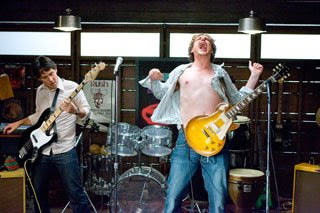 I Love You, Man is the latest comedy from Judd Apatow’s famous “frat-pack,” and it’s so assuredly entertaining and funny that it’s hard to believe Apatow himself didn’t so much as produce. Instead, it’s the brainchild of writer/director John Hamburg and co-writer Larry Levin, who have fashioned a distinct film that falls tonally somewhere in between the family dynamics of Knocked Up and the broad gags of Forgetting Sarah Marshall.
I Love You, Man is the latest comedy from Judd Apatow’s famous “frat-pack,” and it’s so assuredly entertaining and funny that it’s hard to believe Apatow himself didn’t so much as produce. Instead, it’s the brainchild of writer/director John Hamburg and co-writer Larry Levin, who have fashioned a distinct film that falls tonally somewhere in between the family dynamics of Knocked Up and the broad gags of Forgetting Sarah Marshall. The movie stars Paul Rudd as the about-to-be-married realtor Peter, who realizes he doesn’t have any strong male relationships when unsuccessfully trying to find a best man. This becomes an issue after he eavesdrops on his fiancée (Rashida Jones) gossiping about his lack of pals with her girlfriends. Desperate to find somebody to fill the role, Peter seeks the help of his extroverted gay brother (Andy Samberg) to shore up the perfect “bromance.” But buddy-love finds Peter on its own when Sydney (Jason Segel), a laid-back guy’s guy from Venice, shows up at Peter’s open-house looking for a rich cougar. The two hit it off immediately, Sydney goofily complimenting Peter on his choice of Paninis—he’s clearly been to a lot of similar functions in his quest—and obnoxiously speculating on attendees. Typical male bonding ensues, but it’s handled with such a refreshingly unique truth and sense of humor that the audience never remembers they’re watching formula.
The movie’s superior understanding of male relationships lies in the writing and in the lead performances by Rudd and Segel. It hits the right notes out of the gate, never falling for the cliché temptation to make Peter a miserable guy. In real life, the character indeed wouldn’t be outright depressed because he boasts the two defining traits of masculinity—a challenging career and a woman—as scribes Hamburg and Levin perceptively understand. Instead, it isn’t until said woman takes pity on him that he realizes what’s missing in his life, a rational male response. Furthermore, Peter responds in a proactive, almost self-competing way to rectify the issue and prove his masculine worthiness in subtle shame. This unexpectedly real emotional development earns I Love You, Man the frat-pack signature: a comedic story with authentic human emotions.
When the bromance takes off, Rudd and Segel attain buddy chemistry more affectionate and exhilarating than anything moviegoers have seen from Hollywood in awhile. In a second act full of bonding, the leads play into the “opposites attract” mold perfectly, as Paul’s introverted desires are brought out by Sydney’s willingness to act as wildly as reason will allow. The two actors perform on high-wire and their chemistry is insatiable as the movie provides surprisingly fresh takes on set-ups like the buddy jam-session—capped by a funny affection for Rush—and the “man-date” by the beach. It would be inappropriate of me to spoil the jokes themselves, but rest assured: they’re hilarious.
I Love You, Man does have a few problems at the end when the exurbanite amount of time Paul and Sydney spend together inevitably begins to take away from Paul and fiancée Zooey’s relationship. While this is not bothersome for its clichés—given the plot-structure Hamburg and Levin attempt, it’s pretty much necessary—it drags attention to the fact that Paul and Zooey’s bond was never really developed in the first place. The viewer accepts that they love each other at the beginning, but as the relationship continues unsubstantiated, their purportedly perfect pairing seems more like an artificial plot device than a believable union. Yes, Sydney’s intrusion is forcing them apart, but the couple’s initial lack of basic chemistry makes it hard to believe they care enough about each other to not break up completely, especially having only known each other for eight months. It would’ve been nice to see more of Paul and Zooey together in the first act. But the contrived strength of their relationship can ultimately be chalked up to good ole movie magic, and it admittedly provides for one of the movie’s most riotous sex-related gags. (When you see the movie, you’ll know what I’m referring to.)
Is the movie socially significant in the ways that Knocked Up and Superbad were? No, but it isn’t trying to be. Instead, I Love You, Man is a consistently engrossing, silly romp with a keen understanding of the male mind. At the end of the day, that’s about all you can ask of a great March comedy. 3 ½ Buckets out of 4.






